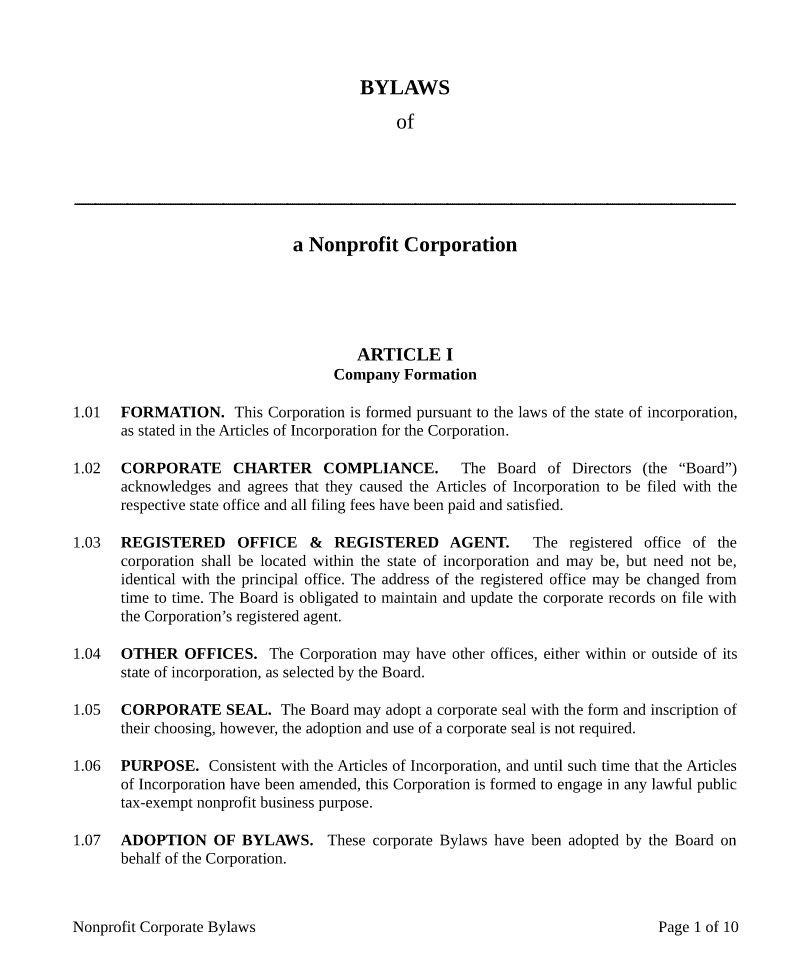Florida Nonprofit Bylaws
Florida nonprofit bylaws work as a rule book for the organization’s members and employees to follow. The bylaws offer agreed-upon responses and internal processes to things such as emergencies, structural changes, internal disputes, and more. Your nonprofit is required to adopt bylaws at the first organizational meeting.
Considering how important the bylaws are to running your nonprofit, writing a thorough and clear draft is crucial to your nonprofit’s success. You can use our attorney-drafted template to get you started.
Why does a Florida nonprofit need bylaws?
Bylaws for a Florida nonprofit offer board members guidelines and processes to respond to future events, making it easy for the organization to breeze through things like board turn-over, emergencies, and structural changes. Unlike your Articles of Incorporation, Florida does not require you to file your bylaws with the Secretary of State. Still, your bylaws are nonetheless incredibly important to your nonprofit’s overall health and success.
1. Nonprofit bylaws are legally required in Florida.
Adopting nonprofit bylaws is legally required by the state of Florida. According to FL non-profit statute 617.0206, your board of directors must adopt initial bylaws to stay in compliance with the state.
Your bylaws may include any provisions that best serve your nonprofit, so long as the bylaws don’t violate state laws or contradict the information provided in your Nonprofit Articles of Incorporation.
2. Third parties will ask to see your bylaws.
Despite not needing to submit bylaws to the state, you will likely need to show your bylaws to people outside of your organization. The bank, for example, might ask to see your bylaws as proof of your organization’s existence before you open your business bank account.
Another way that your bylaws are made public is if your nonprofit applies for 501(c)(3) tax-exempt status with the IRS. You must include your bylaws with your tax-exemption application. The IRS will then make your bylaws available on public record.
3. Nonprofit bylaws allow you more control over your nonprofit.
Without bylaws, your nonprofit could face legal consequences that may take control of the nonprofit out of your hands. Your bylaws are a clear set of rules that everyone within the organization must follow. If you do not have bylaws, or if your bylaws are incomplete, then you leave room for the state to step in and resolve an internal dispute.
Bylaws help you keep control of your nonprofit, minimizing the chances of state involvement.
Want to learn more? Check out our Guide to Nonprofits.
What do Florida Nonprofit Bylaws include?
Bylaws include all of the rules, regulations, and internal processes not covered by the Articles of Incorporation or Florida state laws. The bylaws should work as a comprehensive guide for the board of directors to run the organization, including during times of structural changes and emergencies.
Bylaws should include basic information about your nonprofit and specifics about how the nonprofit will be run internally. You may include things such as:
- requirements for board meetings
- process for internal restructuring
- requirements for voting/holding a quorum
- process for handling conflicts
- process for keeping records
- process for amending the bylaws
- requirements for dissolving the nonprofit
and more!
Are nonprofit bylaws legally binding?
Yes. All bylaws are legally binding after they have been adopted by the board of directors. Failure to follow the bylaws, either purposefully or accidentally, could lead to legal consequences against the nonprofit and the person(s) acting on behalf of the nonprofit.
Are nonprofit bylaws public record?
Not automatically. Your bylaws are an internal document that exists for the running of your organization. The Florida Secretary of State does not require you to file bylaws. However, if you file for 501(c)(3) tax-exempt status with the IRS, you will need to attach your bylaws to the application. Once the IRS approves your application, your documents (including your bylaws) will become public record.
FAQs
No. Your bylaws will be legally binding regardless of signatures. However, we do recommend having your board of directors sign the bylaws when they are adopted—this ensures that everyone starts the nonprofit on the same page.
Yes! Bylaws can be changed at any time according to the process already outlined in the initial bylaws. In fact, you’ll likely want to update the bylaws as your organization grows and changes.
According to FL 617.0205, your board of directors will adopt them at the first organizational meeting held by your nonprofit.
